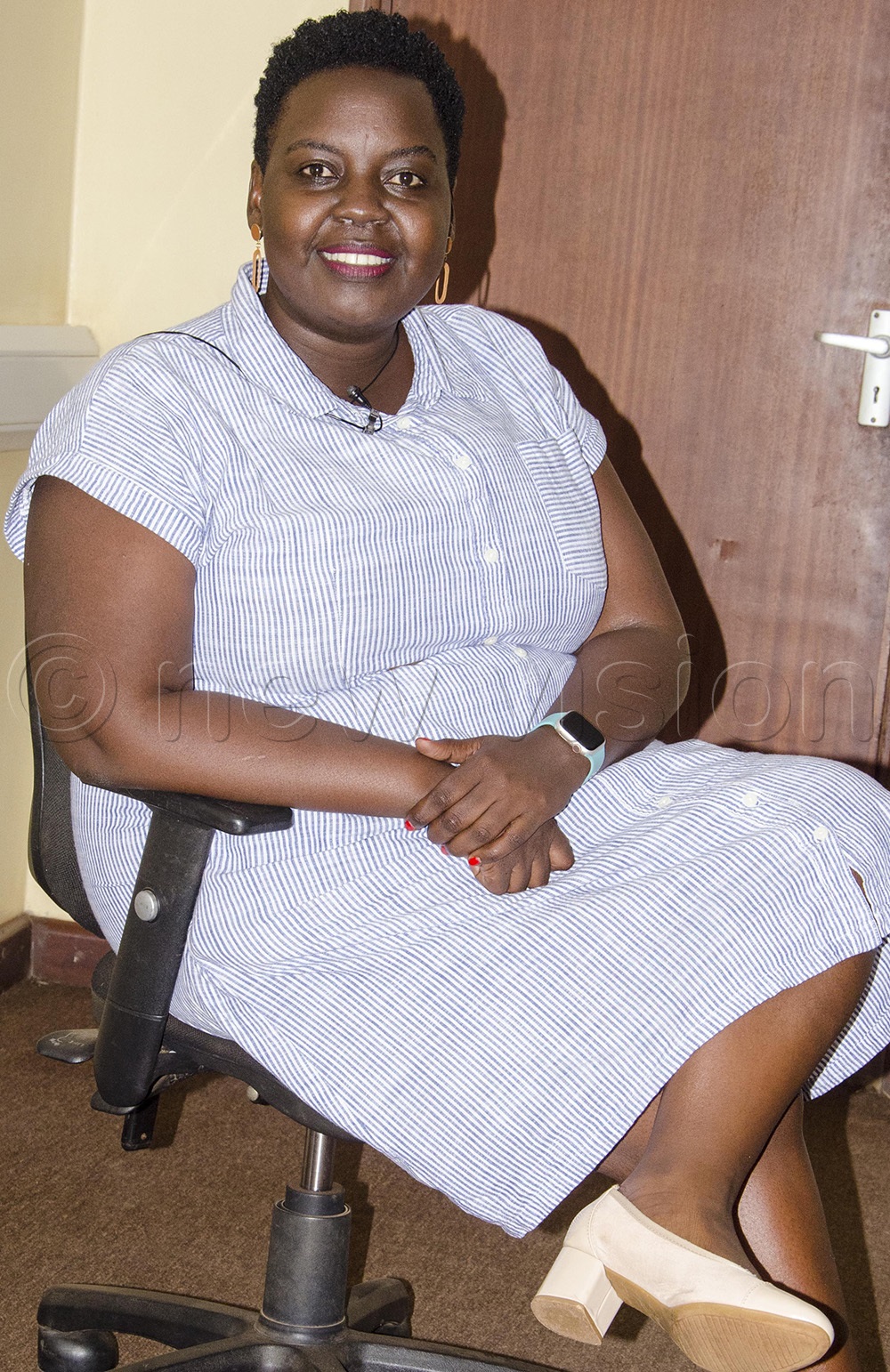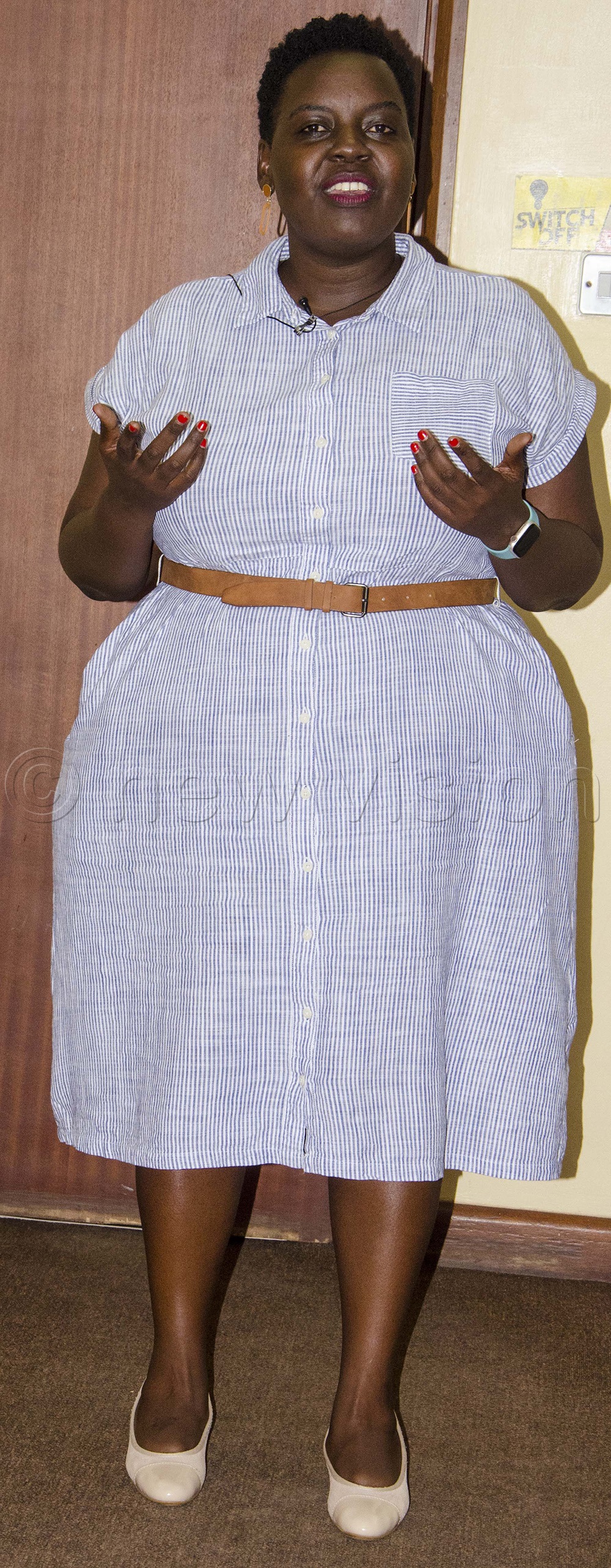Ollama speaks 13 languages to empower and unite Uganda
Ollama doesn’t just speak multiple languages. She has lived them. Born at Mengo Hospital and raised on Kanjokya Street in Kamwokya, a Kampala suburb, she comes from a rich mixture of roots.
Multilingual Claire Ollama, a National Identification and Registration Authority (NIRA) registrar speaking during the interview. (Photo by Colleb Mugume)
__________________
“If you talk to a man in a language he understands, that goes to his head. If you talk to him in his language, that goes to his heart,” said Nelson Mandela.
And that is what inspires Claire Ollama, who speaks 13 languages and counting. For her, speaking many languages is not about fluency; it’s about connection, being understood, and belonging.
When Ollama stepped up to the microphone at the press conference to publicise the launch of Uganda’s national child registration campaign, she had every intention of keeping it standard. English, maybe some Luganda.
“But NIRA had searched for a communication champion, someone who could amplify the message beyond routine public relations and connect with people. They zeroed in on me.”
“I am a registrar at NIRA; I head Buikwe district,” says Ollama with quiet poise. “When I took to the microphone for my first weekly press conference, it went fine. It was just English and the usual stuff,” Ollama recalls.
But when she spotted a few regional broadcasters, some from the west and the east, instinct kicked in. “I thought these stations ran local news bulletins. So, I asked, ‘Can I do this in other languages?"
Multilingual Claire Ollama, a National Identification and Registration Authority (NIRA) registrar poses for a picture during the interview. (Photo by Colleb Mugume)
Then came Lusoga. Then Alur, Runyankore, Kiswahili, and even Acholi. By the time the press conference clip hit social media later that evening, Ollama’s phone wouldn’t stop ringing. What was ordinary to her had struck a national chord.
“I didn’t expect it to go viral,” she says, laughing. “I wasn’t trying to perform. I just wanted the message to reach as many homes as possible.” And it did. But the message that carried through wasn’t just about child registration; it was about identity, belonging, and the quiet power of language.
Raised in many tongues
Ollama doesn’t just speak multiple languages. She has lived them. Born at Mengo Hospital and raised on Kanjokya Street in Kamwokya, a Kampala suburb, she comes from a rich mixture of roots.
Her father is Alur, from Paidha town council, Jupandinka West village in Zombo district near the Congolese border. Her mother is a Musoga from Buseete village, Luuka District in eastern Uganda. At home, English was intentionally absent.
“My dad refused to speak to me in English. Not because he couldn’t — he worked in a bank, Grindlays Bank, now Standard Chartered Bank, but because he was so proud of his heritage. He said, ‘I have paid school fees for English. At home, we speak Alur."
Her mother, not to be outdone, joined in. She learnt Alur. Then she said, ‘I will speak Lusoga to you too.’
Add Luganda from the neighbourhood children and English from school, by the time Ollama entered Primary One, she was already fluent in four languages.
From there, she never stopped learning.
“Alur, Acholi, Langi, Nubian, Juba Arabic, Luganda, Lusoga, Runyankore, Rukiga, Rutoro, Runyoro, Kiswahili and then Kebu and Lendu come naturally if you speak Alur.”
Among the ones she understands: “Japadhola, Kumam, Ruhororo... I can live among them comfortably.” But not every language came easily. “Lugbara is hard. It doesn’t share many words with others, even though it sounds like Kakwa.”
She names the most challenging ones: “Lugbara, Lukonjo, Kakwa and Kupsabiny of the Sebei people. Those are tough languages. If someone speaks them fluently, I respect them.”
Still, she believes that with enough time and immersion, she can learn anything.
“If work took me to Kasese, I would speak Lukonjo in six months. That’s just how it is. It’s a gift. My siblings don’t have it. I can’t explain it, maybe the Holy Spirit gives as He pleases,” she says with a grin. She understands several other languages and is working on formal Arabic and French.
“Most people give up too quickly,” she says. “They think if they make a mistake, they have failed. But you learn by trying. You laugh through the failure, then you grow.”
Language is belonging
Ollama is the kind of person who walks into a room and wants to speak to everyone, not just formally, but deeply, directly, in their own dialect.
“To me, language is empathy,” she says. “It’s how I show respect. When I speak your dialect, I’m telling you: I see you. I value where you are from.”
That perspective, she says, is also why tribalism never took root in her thinking. “Your tribe is an accident of love. If my mother had fallen for someone from Jinja instead of Zombo, I would be a Musoga. So how can I judge anyone for something so circumstantial?”
She recalls being mocked as “Mukoko”, a slur for Northerners, while studying in western Uganda. “It didn’t bother me,” she says. “Wars shaped people’s fears. But I knew that didn’t define me or them.”
Instead of pulling back, Ollama dug deeper. She learnt Runyankore by attending Mass in the local dialect while at Mary Hill High School in Mbarara. She learnt Acholi while babysitting her niece in Gulu. Every language she speaks tells a story of a relationship: a brother, a church, a friend, a community. And her love for language isn’t a performance. It’s a way of life.
“I read the Bible in Alur. I take readings in Runyankore. I use local dictionaries, ask native speakers, and test words out in conversation. And I listen not just to songs, but to meaning, to metaphor.” For her, a line of poetry in a local dialect is more than art. It’s a key to someone’s world.
More than an economist
Ollama’s academic background is in economics. She holds a BA in Economics and a Master’s in Economic Policy Management from Makerere University. She began her career at KCCA, registering taxpayers.
“At NIRA, I now register people instead of revenue,” she says. “But it’s the same principle, giving people visibility. Helping them be seen.”
She’s currently pursuing a postgraduate diploma in Communication and Journalism and was recently elected class president at the Uganda Management Institute.
Her former literature teacher called her after the viral press moment and said, “You are not just an economist anymore. You are a policy communicator now.”
She took the title to heart.
“I finally have direction,” she says. “I’m learning how to match message to audience, in every language that matters.”
The mother tongue at home
Ollama is also a mother, and she’s intentional about raising her children multilingual.
“I speak to them in Alur and Lusoga, their grandfather’s and grandmother’s languages, as well as Nubian, which I learnt while in Arua, my husband’s home district. And I do teach them words in Lugbara as well, which is their father’s language, although I haven’t fully mastered it. And when they visit the village, I insist they greet their relatives in Lugbara.”
Ollama worries that many Ugandan children are losing their heritage languages to English, and with it, a piece of their identity.
“There’s 16 years of formal education ahead. There will be plenty of English. But where in that is the space for Lusoga? For Alur?” and other local languages.
She wants her children to know they are Ugandan, not just by papers, but by culture.
“I want them to meet their grandmother and greet her the right way, not with ‘Hi Grandma’ but with a word that carries history, respect, and belonging.”
More than words
Ollama’s story is not just about fluency. It’s about the emotional connection of language, the way a single phrase, well placed, can soften walls and open doors.
At NIRA, she no longer gives out information. She communicates. “Business development, public service, even parenting, it’s all about connection,” she says. “When I meet a Mujuni, I greet them in Runyankore. Immediately, the wall comes down. That is the magic.”
She admits she sometimes mixes up languages mid-conversation. “My brain is moving faster than my mouth,” she says, smiling. “But that’s how it is when you live in many tongues.”
She doesn’t aim for perfection, only progress. “I’m always learning. Always listening. Always speaking.”

Multilingual Claire Ollama, a National Identification and Registration Authority (NIRA) registrar speaking during the interview. (Photo by Colleb Mugume)
And in doing so, she gives others permission to do the same to learn, to stumble, to grow. Language, after all, isn’t just about speaking clearly. It’s about being heard.
Language is more than words. It’s love
Ollama has always known the power of language. But in Buikwe, it showed her just how deep that power runs.
“There are many memories,” she says, “but one that moved me deeply was an elderly woman who came to register. My team tried, but they just couldn’t understand her. Over an hour passed — confusion, frustration, silence. Then I saw her name, Drichiru, I think, and something clicked.
I spoke to her in her language. You should have seen her smile. She hugged me. She hadn’t even explained her issue yet, but the fact that someone understood her, that was everything. She finally felt seen, heard, believed.”
The woman had no living parents. No witnesses to vouch for her. But Claire helped her take an oath in court and got her registered. The next day, she returned not with another complaint, but with a bunch of matooke and a live cock.
“I told her, ‘You don’t even have your ID yet. You don’t need to thank me. It’s my job.’ And she looked me in the eye and said, ‘You don’t understand. You became my voice."
Now the woman qualifies for the PDM fund and the Social Assistance Grants for Empowerment programme for the elderly. But more than that, she has dignity again.
Ollama shrugs off praise. “People ask me, ‘What’s in it for you?’ This. These moments. That’s the reward. Like Mother Teresa said, we can’t all do great things, but we can do small things with great love. This is my small thing. And I believe goodness comes back. Maybe not back to me, but to my children, or to someone I meet. It doesn’t die.”